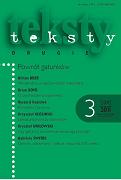Literaturoznawczy darwinizm
Literary Darwinism
Author(s): Krzysztof KłosińskiSubject(s): Literary Texts
Published by: Instytut Badań Literackich Polskiej Akademii Nauk
Keywords: Literary Darwinism; Literary studies; Charles Darwin; Humanities; Scientism
Summary/Abstract: „Literary Darwinism” was established in the mid-1990s in opposition to those currents of the humanities that could be referred to as „theory” (as defined by Jonathan Culler) or „post-structuralism”. According to the „Darwinists”, the main authority figures of those currents were Michel Foucault and Jacques Derrida. The “Darwinists” blame this approach for explaining cultural phenomena within a system detached from the actual world, i.e. for a „textualization” of the world, which supposedly endows „language specialists” with the (usurped) status of „the world's main intellectuals.” The ”Darwinists” find the books dedicated to the role of narration and narrative in the works of Darwin, written by professors of English Gillian Beer and George Levine, as examples of such an usurpation perpetrated by literary studies against the theory of evolution, an usurpation wherein science is treated as a kind of language. Therefore, the „Darwinists” postulate their own new paradigm that is meant to re-establish the primacy of scientism in the humanities (empiricism, the cumulative character of knowledge, causal explanation). On the example of works by Joseph Carroll, Jonathan Gottschall and Brian Boyd, who treat literature as a (Darwinian) adaptation of human to its habitat, this article interprets the „Darwinian paradigm” as an attempt to attain discursive hegemony in literary studies (as defined by Chantal Mouffe).
Journal: Teksty Drugie
- Issue Year: 2011
- Issue No: 3
- Page Range: 33-51
- Page Count: 19
- Language: Polish

